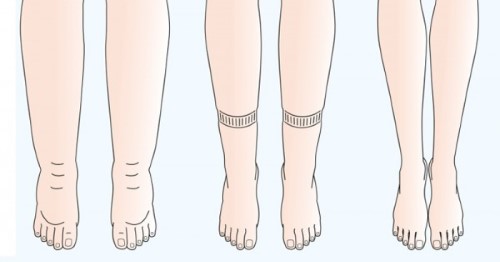The retention of fluid within the cavities, circulatory system and/or tissues of the body is known as edema. It is more commonly referred to as water retention but regardless of what you call it, it can result in swelling, particularly in the extremities.
Edema is a common problem in inactive people, as well as those who lead a sedentary lifestyle or who are on long-term medication. Although it is not a life-threatening condition in many cases, it can often lead to more serious issues, including kidney disease and heart failure.
What might come as a surprise to you is that there are ways to prevent edema and if you have the problem, it can be treated and the swelling can be reduced.
Finding the cause of edema is the first step in being able to treat the problem. Here are some of the most common reasons why edema occurs.

1. Excessive Sodium
Consuming high sodium foods along with dehydration causes the body to retain water. The cells may become 20 times larger with water, and it is done to dilute the salty environment that exists in your body.
Salt is not only found in your saltshaker but it can also be found in canned vegetables, processed meats and even some condiments.
There is a type of salt that doesn’t lead to water retention and may be able to help you reverse it. If you drink water along with Himalayan or Celtic sea salt, it may help to reduce water retention.
2. Vitamin B6 Deficiency
Vitamin B6 helps to balance the water levels in the body so if you are lacking in this vitamin, water retention may be a problem.
A study was done on women who suffered from water retention because of premenstrual syndrome and they found that taking vitamin B6 was extremely beneficial.
In fact, this study noted that supplementing with vitamin B6 worked better than any other supplements they had tried before. Vitamin B6 is water-soluble and for the best results, it should be taken in the form of whole foods.
Foods that have a high vitamin B6 content include tuna, turkey, chicken, dried fruit, sunflower seeds, unpeeled potato, pistachio nuts, lean beef and bananas.
3. Potassium Deficiency
Potassium is vitally important for the proper function of the body organs, cells and tissues. It is an electrolyte that helps the balance water in the body. You may be lacking potassium if you sweat excessively, consume foods that are rich in salt or are not eating enough foods that contain potassium.
Potassium deficiency can lead to other problems as well, including cramps, weight gain and muscle spasms.
You can find potassium in almost all types of fruit but it is found in abundance in watermelon and honey melon. It is better if you increase the amount of potassium rich foods that you are eating rather than taking a supplement.
4. Dehydration
If you are not drinking enough water, your body will react in the opposite way that you might think it would react. It begins to retain water, knowing that it needs it to survive. When you drink enough water on a daily basis, edema is reduced.
5. Magnesium Deficiency
If you are retaining water, it is also a common symptom of magnesium deficiency. Magnesium is important for almost every function in the human body so low levels can cause numerous problems.
Studies have shown that as little as 200 mg of magnesium daily can lower water retention in women with premenstrual syndrome.
You can either increase the magnesium rich foods that you eat or take a high quality supplement. The food choices for magnesium include dark green vegetables, dark chocolate, nuts, avocados, whole grains, spinach, peas, yogurt and dried fruit.
6. Eating Processed Foods
Processed foods should be avoided whenever possible, because they are high in sodium and sugar and typically contain preservatives that are toxic to the liver, kidneys and the rest of the body. This is especially true of artificial sweeteners and foods rich in sugar.
It is always beneficial to avoid processed foods as it can help detoxify the body and keep your liver healthy.
There are a number of herbs that can also help to reduce a problem with water retention. These herbs have strong diuretic properties, and they include the following:
Horsetail
Dandelion
Corn silk
Nettle
Hibiscus
Garlic
Fennel
Parsley
Via: Healthy Food House
Be sure to share this with your friends on Facebook
